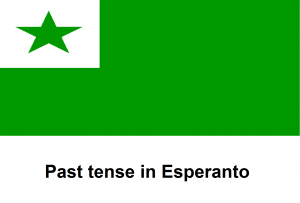Difference between revisions of "Language/Esperanto/Grammar/Past-Tense"
Jump to navigation
Jump to search
(Created page with "In Esperanto, expressing past tense is changing the "-i" of a verb to "-is". I came. - Mi venis. I ate an egg - Mi manĝis ovon.") |
m (Quick edit) |
||
| (5 intermediate revisions by 3 users not shown) | |||
| Line 1: | Line 1: | ||
[[File:Past tense in Esperanto.png|alt=Past tense in Esperanto|thumb|Past tense in Esperanto]] | |||
I ate an egg - Mi manĝis ovon. | Hello everybody, | ||
In today's lesson you will learn some useful vocabulary about '''¨PAST TENSE¨''' in Esperanto. | |||
Feel free to edit this page by adding new words and expressions ! | |||
Happy learning ! :) | |||
Upon getting the hang of this topic, you may find these relevant lessons worthwhile: [[Language/Esperanto/Grammar/Gender|Gender]], [[Language/Esperanto/Grammar/Negation|Negation]], [[Language/Esperanto/Grammar/Word-Order|Word Order]] & [[Language/Esperanto/Grammar/SUFFIXES|SUFFIXES]]. | |||
== '''Some explanation for Past tense in Esperanto''' == | |||
'''<big><u>OBS.: In the infinitive form; change the last letter (-i) by (-is) to form the Past Tense</u></big>''' | |||
{| class="wikitable sortable" | |||
!<big>'''ENGLISH'''</big> | |||
!<big>'''PRONUNCIATION'''</big> | |||
'''<big>ENGLISH</big>''' | |||
!'''<big>ESPERANTO</big>''' | |||
!'''<big>PRONUNCIATION</big>''' | |||
'''<big>BRAZILIAN</big>''' | |||
'''<big>PORTUGUESE</big>''' | |||
!'''<big>BRAZILIAN</big>''' | |||
'''<big>PORTUGUESE</big>''' | |||
|- | |||
| | |||
| | |||
| | |||
| | |||
| | |||
|- | |||
|to have | |||
|'''''hah vih''''' | |||
|'''<big>havi</big>''' | |||
| | |||
|ter | |||
|- | |||
| | |||
| | |||
| | |||
| | |||
| | |||
|- | |||
|I had | |||
|'''''mih hah vihs''''' | |||
|'''<big>Mi havis</big>''' | |||
|'''''mi Ha vis''''' | |||
|Eu tinha | |||
|- | |||
|You had | |||
|'''''vih hah vihs''''' | |||
|'''<big>Vi havis</big>''' | |||
|'''''vi Ha vis''''' | |||
|Você tinha | |||
|- | |||
|He had | |||
|'''''lih hah vihs''''' | |||
|'''<big>Li havis</big>''' | |||
|'''''li Ha vis''''' | |||
|Ele tinha | |||
|- | |||
|She had | |||
|'''''shih hah vihs''''' | |||
|'''<big>Ŝi havis</big>''' | |||
|'''''chi Ha vis''''' | |||
|Ela teve | |||
|- | |||
|We had | |||
|'''''nih hah vihs''''' | |||
|'''<big>Ni havis</big>''' | |||
|'''''ni Ha vis''''' | |||
|Nós tínhamos | |||
|- | |||
|You had | |||
|'''''vih hah vihs''''' | |||
|'''<big>Vi havis</big>''' | |||
|'''''vi Ha vis''''' | |||
|Vocês tinham | |||
|- | |||
|They had | |||
|'''''ih lih hah vihs''''' | |||
|'''<big>Ili havis</big>''' | |||
|'''''ili Ha vis''''' | |||
|Eles tinham | |||
|- | |||
| | |||
| | |||
| | |||
| | |||
| | |||
|- | |||
|I came | |||
|'''''mih veh nihs''''' | |||
|'''<big>Mi venis</big>''' | |||
|'''''mi ve nis''''' | |||
|Eu vim | |||
|- | |||
|I ate an egg | |||
|'''''mih mahn jihs oh vohn''''' | |||
|'''<big>Mi manĝis ovon</big>''' | |||
|'''''mi man djis o von''''' | |||
|Eu comi um ovo | |||
|} | |||
=== '''In Esperanto, expressing past tense is changing the "-i" of a verb to "-is".''' === | |||
*'''I came. - Mi venis.''' | |||
*'''I ate an egg - Mi manĝis ovon.''' | |||
==Other Lessons== | |||
* [[Language/Esperanto/Grammar/COMPARATIVES|COMPARATIVES]] | |||
* [[Language/Esperanto/Grammar/THE-PARTICIPLES|THE PARTICIPLES]] | |||
* [[Language/Esperanto/Grammar/PREPOSITIONS|PREPOSITIONS]] | |||
* [[Language/Esperanto/Grammar/Adjectives|Adjectives]] | |||
* [[Language/Esperanto/Grammar/Interrogation|Interrogation]] | |||
* [[Language/Esperanto/Grammar/Verbs|Verbs]] | |||
* [[Language/Esperanto/Grammar/ADVERBS|ADVERBS]] | |||
* [[Language/Esperanto/Grammar/WORD-BUILDING|WORD BUILDING]] | |||
* [[Language/Esperanto/Grammar/CONJUNCTIONS|CONJUNCTIONS]] | |||
* [[Language/Esperanto/Grammar/Comaratives-and-Superlatives|Comaratives and Superlatives]] | |||
<span links></span> | |||
Latest revision as of 20:08, 26 March 2023
Hello everybody,
In today's lesson you will learn some useful vocabulary about ¨PAST TENSE¨ in Esperanto.
Feel free to edit this page by adding new words and expressions !
Happy learning ! :)
Upon getting the hang of this topic, you may find these relevant lessons worthwhile: Gender, Negation, Word Order & SUFFIXES.
Some explanation for Past tense in Esperanto[edit | edit source]
OBS.: In the infinitive form; change the last letter (-i) by (-is) to form the Past Tense
| ENGLISH | PRONUNCIATION
ENGLISH |
ESPERANTO | PRONUNCIATION
BRAZILIAN PORTUGUESE |
BRAZILIAN
PORTUGUESE |
|---|---|---|---|---|
| to have | hah vih | havi | ter | |
| I had | mih hah vihs | Mi havis | mi Ha vis | Eu tinha |
| You had | vih hah vihs | Vi havis | vi Ha vis | Você tinha |
| He had | lih hah vihs | Li havis | li Ha vis | Ele tinha |
| She had | shih hah vihs | Ŝi havis | chi Ha vis | Ela teve |
| We had | nih hah vihs | Ni havis | ni Ha vis | Nós tínhamos |
| You had | vih hah vihs | Vi havis | vi Ha vis | Vocês tinham |
| They had | ih lih hah vihs | Ili havis | ili Ha vis | Eles tinham |
| I came | mih veh nihs | Mi venis | mi ve nis | Eu vim |
| I ate an egg | mih mahn jihs oh vohn | Mi manĝis ovon | mi man djis o von | Eu comi um ovo |
In Esperanto, expressing past tense is changing the "-i" of a verb to "-is".[edit | edit source]
- I came. - Mi venis.
- I ate an egg - Mi manĝis ovon.
Other Lessons[edit | edit source]
- COMPARATIVES
- THE PARTICIPLES
- PREPOSITIONS
- Adjectives
- Interrogation
- Verbs
- ADVERBS
- WORD BUILDING
- CONJUNCTIONS
- Comaratives and Superlatives
